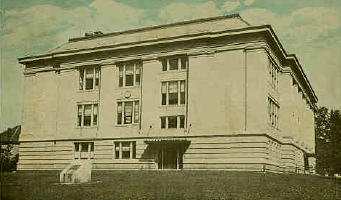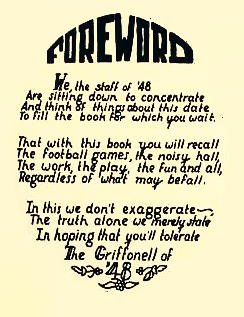|
My mother was unceasing and insistent advocate for her children. To her kids' embarrassment, and to their grudging benefit, she fussed and made a scene over educational issues: things that her taxes were supposed to pay for, that her children deserved, and that the society itself deserved from her kids' superior endowments. Though our country school covered grades one through eight, she petitioned to the downtown principal Davey, and to the board of education, to accept her Kenneth two years early, into seventh-grade. Her child's mind should not be wasted by two more years' exposure to the same old mediocre teacher. Mr. Davey patted her on the head, in effect, and anticipating Garrison Keillor, said that every mother thinks her child is well above average. That put me in a fix. I wanted to prove her right and be a good student. But I also wanted to be a normal kid, and not a soldier in her battle of politics and conceit. The battle turned moot, possibly because of her nudging: that autumn all seventh and eighth graders of the countryside were bused in to the central school, and I didn't have to be special. A year later all country schools were closed and their kids, grade one and up, came to town. The school was called Griffith Institute and Central School, and you really should say the whole name, with a slight nod for the first part, because Griffith was the fellow who donated ten thousand dollars to start it very long ago, if I remember correctly, just a few years after Native Americans saved Columbus and his crew who were foundering off St. Croix. The bad news first, about aggressive sports, euphemistically called physical education: when we lined up in gym by height, I was next to shortest, emphasizing that I was too pitifully small, weak and young to be there. I had thought myself well-coordinated but, in varsity baseball I never got into the game, and in basketball, as a member of the third string, somewhere in the records there is but a single tick mark showing that in one game I was fouled and made one of two foul shots. In gym I was never the first, or second, or third to be chosen when teams were picked for softball. I always dropped my hands four inches short of stopping a grounder, and my batting was so-so. But one thing surprised all of us: I could catch in my bare hands a well-thrown softball, no matter how hard and fast; thereafter, on whatever team, I played first base. The legitimate stage was a happier place. As a Sophomore, I was a vacuum cleaner salesman whose machines emitted bad stuff that killed people who I (but not the cops) thought needed killing. As a Junior, I was the grumpy grandfather Putnam in the comedy "Spring Green"; tooling fast forward in his wheelchair, doing a hand-braked 180 and continuing in the original direction backward, he screeched to a stop two feet short of toppling off the stage backward. As a Senior, I was Reverend March in "Little Women," who carried sweet delicate Beth in his arms (enjoyed practicing!) and plunked her into a living room chair to die. I flubbed badly on the opening night, before a packed auditorium: I dashed into the room to proclaim that we had just received an important letter, but had neglected to bring the letter on stage with me! I blurted something like "Hey, has the mail come?" and reverted to fetch it from the frantic stage assistant. Afterward, instead of dressing me down, our play director said "Congratulations! What a terrific ad lib!" The star of Spring Green was my good friend David B. who, a couple years after I went to college, died for real in an automobile accident. I was so stunned by the news that I didn't even send a note of condolence to his parents, and later felt just terribly embarrassed not to have done it. David was the senior guy voted "best actor," "most energetic," and "best personality"; for any pair of those I, in my rarified social milieu, would have gladly traded in both my "most studious" and "most likely to succeed." My mother hovered relentlessly over my education, with little praise and much disapproval — no doubt with good intentions, but I so resented her criticism. As a sophomore, I entered a contest: all Erie County students wrote letters to candidate-for-state-senate Siprell, telling him who they'd vote for and how they themselves would serve in that office. In my letter, I piled high the political jargon; predictably, Mom read it, scowled, and turned away. So, remember what happened, dear Mother? I won the $50 first prize for the whole county, and my letter was read on the radio. What a grand time I had with that, acknowledged in the hallway by juniors and seniors, some of them with their pitiful one or two dollar prizes. I smiled back at them, in calculatedly modest smugness. In the war, we were as far from the Nazis as you could get in New York State, and much farther yet from Japan. Nevertheless, we had aid raid drills, not nuclear age duck-and-cover but, with time to scatter as bombers approach, it was spend-an-hour-in-town with a friend. The thought that Germans might want to bomb Springville was quite a stretch. But, hey, maybe the white mice in the lab at the East end of town were a cover for something sinister. Years later, when I petitioned and protested research in CBR warfare, that old odd thought, still spooky, seemed just a bit more real.
Most enjoyable of the classes was Problems of Democracy. We probably
had sophisticated discussions, but the memorable thing was birthday
parties, for which the honorees brought the treats. By that time, I
had badly splattered two spreads in my Mom's recipe book. One was chocolate
cupcakes, but for my party I chose the other. I brought to class six
banana cream pies. They were a grand hit, and publicized! When, in an
assembly program, I was called to the stage to be given a prize for
something or other, I was further congratulated as the guy who baked
such wonderful pies that I would make someone a good wife. Very funny,
everyone else thought. As in family matters, some unresolved issues with classmates still linger. What an embarrassing waste of energy! Here's one packet: one of my classmates, a smooth talker, was always asking me for money, saying that he would pay me back. He once pointed through a window to a model stagecoach that he owned and sold it to me for a quarter. I just didn't know how to say no. But I did keep track, and each time he got his nickel, or more, I reminded him how much he then owed me. Where does his tab stand now, that monotonically increasing function of time? He (or his estate), for 57 years, has been owing me two dollars and forty-five cents! In my Senior year, I had a girlfriend. It was true adolescent love.
I went on to Cornell and she, a year later, to college elsewhere. We
kept in touch, the relationship flamed, flickered and faded. I later
learned that her mother berated my mother because I did not marry my
young love — such was the presumed prerogative and responsibility
of captains of jostling family ships. On leaving high school, my career as poet had burst forward momentarily. As editor of the yearbook, I wrote its foreword:
It was a grand and unusual yearbook, with Zehrma's artwork following a motif of fanciful castles and courts. We used excised visages of faculty and other notables to top-off bodies of knights, jesters, princes and princesses. Desecration? The teachers with medieval bodies (or court folk with new heads?) seemed not to mind; sixty years later they are still smiling. By scholastic measure, I justified my mother's early campaign. The last set of exams surprised even me. In typing, I messed up the first half of my allowed set of sheets, took a deep breath and said to myself I can do this. I restarted cautiously, finishing with what the teachers, in their early excitement, thought was a perfect package. But they finally noticed that I had typed 'on' instead of 'in' and I thus got only a 99. For the physics regents’ exam, the sans-answer-sheet teacher (presumed to know the answers), in fact did not know whether a good absorber of heat is therefore a good, vs. bad, radiator. I did a search for him and finally reported that I had guessed wrong; thus, only another 99. (It comes directly from thermodynamics, whose laws I've heard most succinctly from Jim Blinn: 1. You can't win; 2. You can't even break even; 3. You can't get out of the game.) Other scores were not quite as memorable, but not bad. It was good to have that surfeit of 90's at the very end; I was outa there, and avoided another round of caricature as "The Brain." High school, on my life's scale of struggles, was not the big challenge; my teasers should have followed, to see me really struggling through Engineering Physics. When I graduated from high school, Mr. Davey had gone elsewhere. My Mom, so I've heard, tracked him down and rubbed his nose in my diploma as valedictorian. If she did, I'm glad, but also glad that I wasn't there. Pleased with what I had done, I didn't want to gloat on her behalf. I did it, but not as her damned pawn. |


